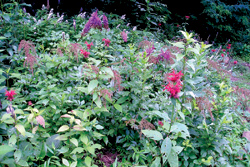When I was 25 years old, I lost a boyfriend but gained a lifelong passion. As Karel Capek writes in the essay "How a Man Becomes a Gardener," "From such beginnings the gardener yields more and more to this newly awakened passion, which is nourished by repeated success and spurred on by each new failure; the passion of the collector bursts out in him, driving him to raise everything according to the alphabet from Acaena to Zauschneria; then a craze for specialization breaks out in him, which makes of a hitherto normal being a rose — dahlia — or some other sort of exalted maniac."

Capek calls gardening "an insatiable passion," and mine began the day I met my boyfriend's father. The man was known to be relentless and driven in his professional life, and friends feared for my life.
But I wasn't worried — well, not too much. After all, dads didn't usually get involved with who was dating whom, leaving that to the moms. In my experience, dads generally looked up from whatever they were doing, threw up their hand in greeting and, later, rarely even remembered your name.
I met my boyfriend's dad in his garden, bent over a bed. My whole life had been spent in gardens laid out in efficient rows and tilled out of necessity each year. But his was different — he gardened out of desire, not need. And he did it in a way that was alien to me: raised beds laid out in his backyard and filled with asparagus, cucumbers, spinach, tomatoes, lettuces and peas, all surrounded by marigolds and cosmos. Morning glories climbed his fence, and bags of soil lay nearby. It was abundant, orderly and achingly beautiful.
As I'd expected, he threw up his hand in acknowledgement and went back to weeding lettuces. But then his wife whispered a secret: "The garden is his midlife crisis. Instead of a sports car, he chose a garden." I wanted to hug her right then and there, but I restrained myself.
Some gardeners, says Capek, "fall victim to an artistic passion, and continually alter and rearrange their beds, devise color schemes, move shrubs, and change whatever stands or grows, urged on by a creative discontent." Little did I know this mania was about to overtake me.
Intimidated, I shyly inquired about his garden. That was all it took: Without a moment's hesitation, he stood up and gave me a tour. I had a thousand questions; he had a thousand answers.
His family graciously welcomed me into their home, and the daunting dad welcomed me into his garden. I was given the privilege of planting, weeding, harvesting and — in his absence — tending to it. I was even bequeathed my own little plot where I planted everything from radishes to bok choy, corn and beans to dinner-plate dahlias. I remember the dad's first inspection of my efforts. The beds were weed-free, tidied up, aerated and watered. And as we walked slowly, examining everything, the pleasure on his face was my more-than-adequate reward. I'd done a good job; I was officially on my way to becoming a gardener.
Twenty-five years have passed, but the memory of that first real garden is as vivid as the one that's right outside my window now. I remember how quickly those first radishes came up. I remember potatoes that didn't even need butter. I remember the boyfriend getting bored with all the gardening talk and eventually moving on. But through it all, my passion for gardening has endured.
Capek muses over how this obsession first gets hold of us, before we blossom as collectors, creators and crazed individuals who spend winters tapping toes, staring out of windows and scowling as we wait for spring. "Let no one think that real gardening is a bucolic and meditative occupation," he warns. "It is an insatiable passion, like everything else to which a man gives his heart."
I know how it happened with me. One man chose a garden over a sports car and found time, amid his all-consuming work, to teach his son's girlfriend how to garden. And out of that, a gardener was born.
Cinthia Milner lives in Leicester.



I always enjoy your articles. Thank you.
You are welcome, and thank you for saying so.